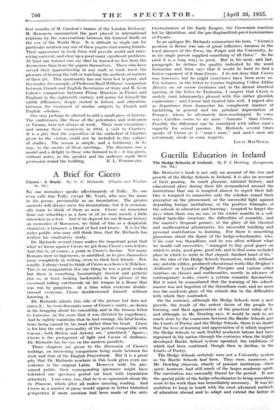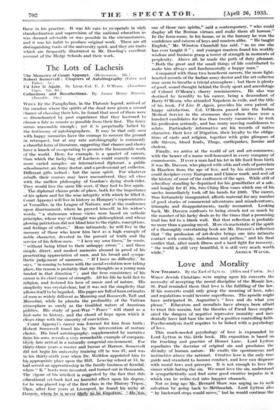Guerilla Education in Ireland
MR. DOWLING'S book is not only an account of the rise and growth of the Hedge Schools in Ireland, it is also an account of their passing. So much glamour, national history, and educational glory during their life accumulated around the institutions that one is tempted almost to regret their fall. One is tempted to remember only the scholars round their preceptor on the greensward, or the successful fight against degrading foreigm institutions, or the positive triumphs of the schools in education and learning ; tempted to forget the days when there was no sun, or the winter months in a sod- walled barn-like structure, the difficulties of assembly, and the master's frequent penury, in the glory of his classical and mathematical attainments, his successful teaching and personal contribution to learning. For there is something glamorous about the figure of the hedge-schoolmaster, who, if his coat was threadbare, and he was often without what we would call necessities, managed to buy good paper on which to write, good pens; good ink, and to find some secluded place in which to write in that elegant, finished hand of his." So, the idea of the Hedge Schools themselves, which, without any suitable edifice, produced educational works like Deighan's Arithmetic or Lynch's Polyglot Preceptor and various other treatises on classics and mathematics, mostly in advance of contemporary works, exerts a certain romantic fascination. But it must be remembered that the learning of the school- master was not begotten of the threadbare coat, and no more was the academic glory of the schools due to the difficulties with which they contended.
On the contrary, although the Hedge Schools were a new growth, the result of the ardent desire of the people for learning, and their appreciation of the practical value of it. and although, as Mr. Dowling says, it would be rash to set much store by the connexion between the Bardic Schools and the Courts of Poetry and the Hedge Schools, there is no doubt that the love of learning and appreciation of it which inspired the Hedge Schools to such fruitful academic labour had been ingrained in the nation through the centuries when the highly- developed Bardic School system operated, the traditions of which had been continued, though then in decline, in the Courts of Poetry.
The Hedge Schools certainly were not a University system as the Bardic Schools had been. They were, moreover, as Mr. Dowling observes, clearly of peasant institution—their spirit, however, had still much of the larger academic spirit. The curriculum was unusually liberal for the period.- It was the special pride of the hedge-schoolmaster to bring something more to his work than was immediately necessary. It was his ambition to keep in touch with the most advanced methods of education abroad and to adapt and extend the better of 'these in his practice.- It was lits. -CstreTIOCti-:6Peiiale in stiVi Standardization and supervision of the national education as Was deemed advisable or was posSible in the circumstances, And it was his habit to produce original work. These are all .distinguishing traits of the university spirit, and they are traits which are frequently illustrated in Mr. Dowling's excellent account of the Hedge Schools and their-work.











































 Previous page
Previous page